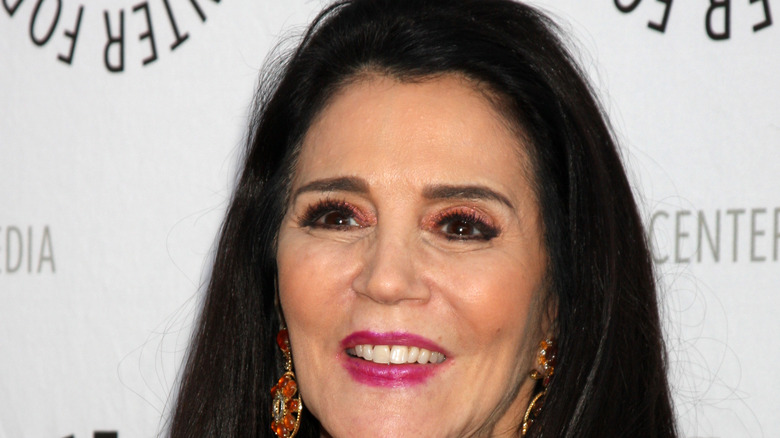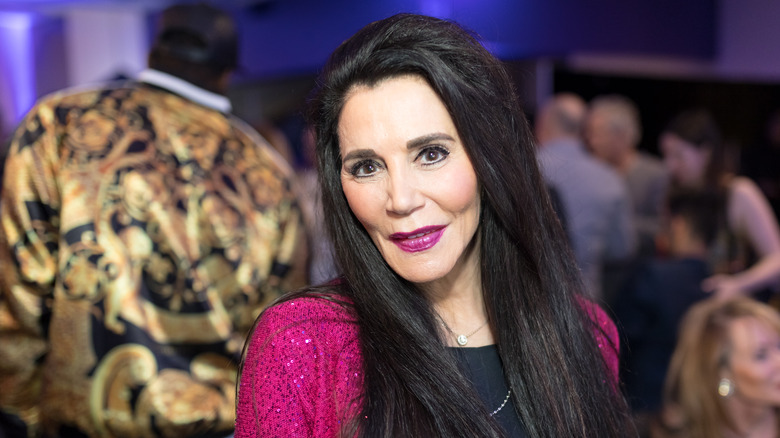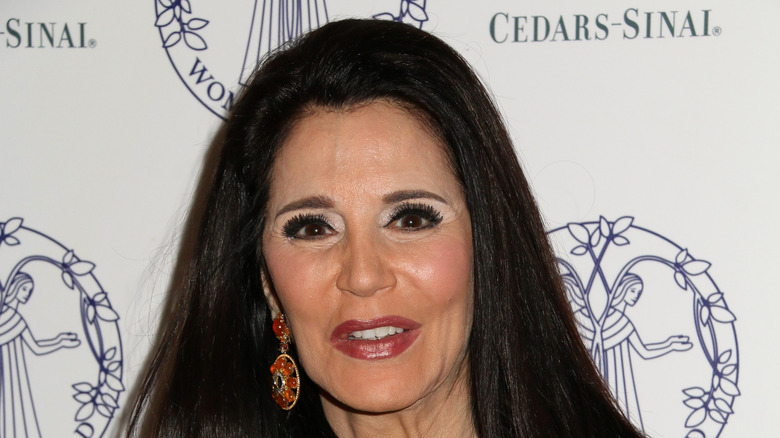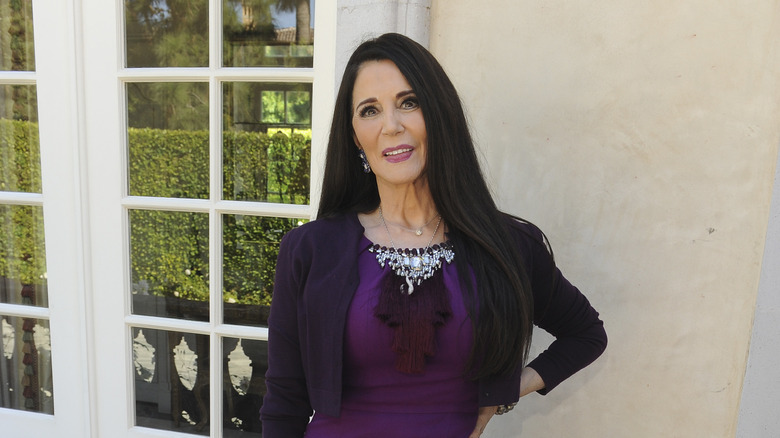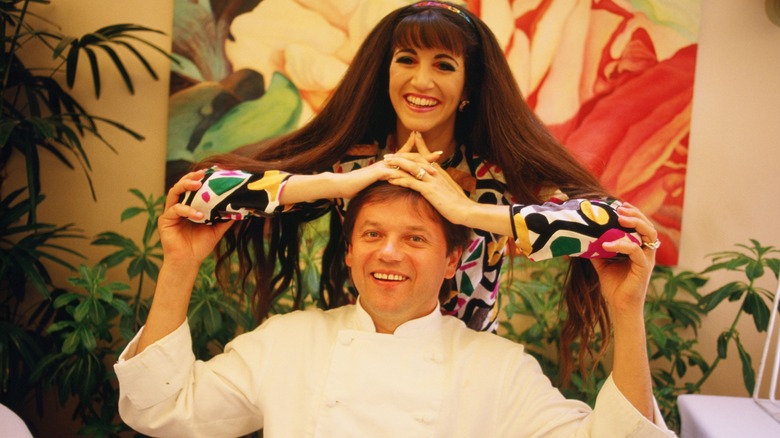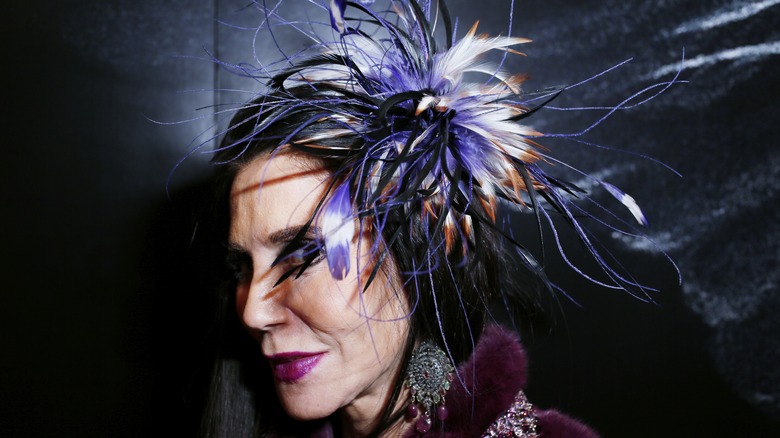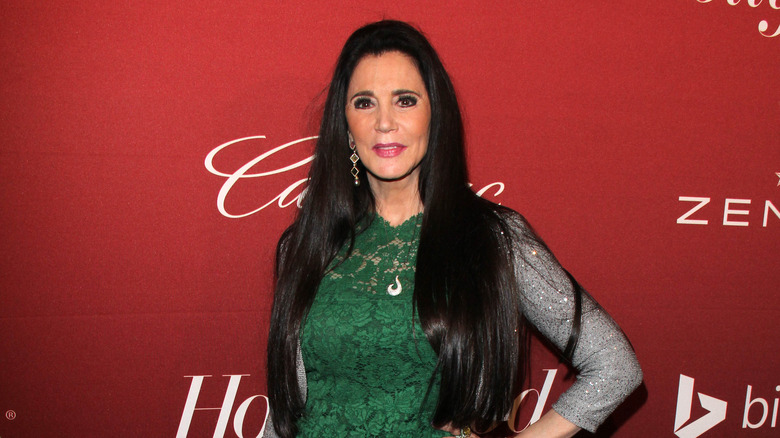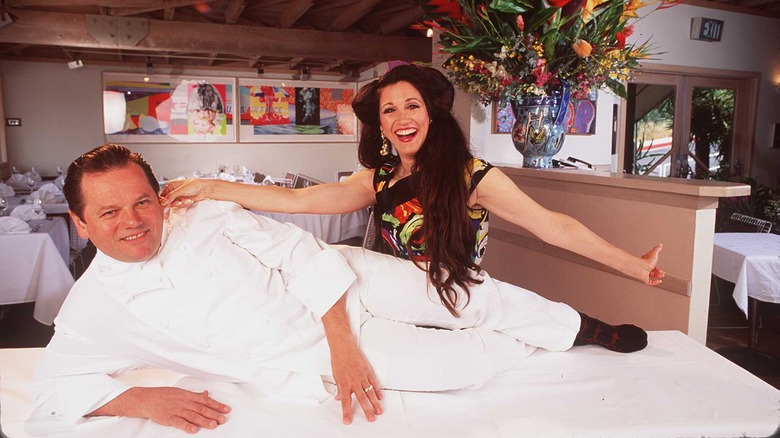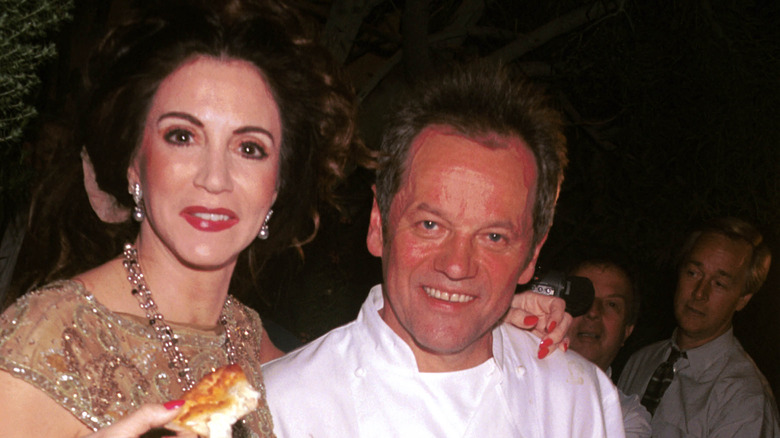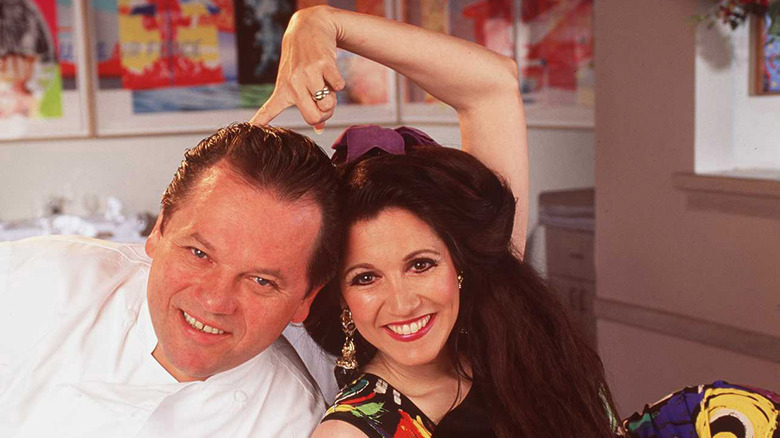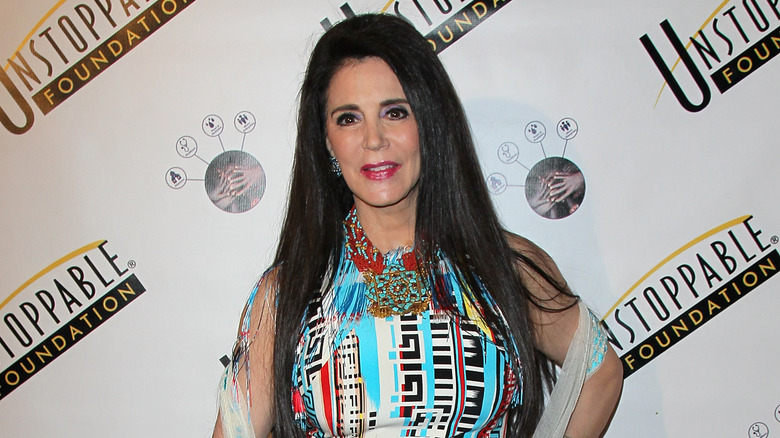The Untold Truth Of Wolfgang Puck's Ex-Wife, Barbara Lazaroff
When longtime watchers of the Los Angeles restaurant scene hear the expression "behind every successful man is a strong woman," chances are an image of Barbara Lazaroff will flash in their minds. Just as her now-ex-husband, Wolfgang Puck, defined California cuisine and pioneered national dining trends such as pizzas with non-traditional, artisanal toppings, Barbara Lazaroff is widely considered responsible for defining the public image of Wolfgang Puck, turning him from a respected but quiet chef into a global celebrity and entrepreneur, according to Forbes.
But during her 20-year marriage to Puck, Lazaroff was far more than just Puck's personal muse. A respected interior designer, she brought her passion for design to Puck's restaurants, which became known for their memorable, dramatic interiors as well as for their food. And it was her entrepreneurial bent that encouraged and enabled Puck to build a restaurant empire and become a household name. Her journey with Puck and afterward has been filled with surprises — here is just some of what she has accomplished, both with and without him.
Barbara Lazaroff is a two-time James Beard Award winner
Barbara Lazaroff didn't just propel Wolfgang Puck into culinary stardom, she became a star in her own right for her community work and her creative restaurant designs, both for Puck and other restaurateurs, according to her website. A member of the American Society of Interior Designers, she founded her own design firm, Imaginings Design, Inc., in 1981. Her first professional collaboration with Wolfgang Puck was the interior design for his first restaurant, the original Hollywood location of Spago. His creative cooking and her welcoming design immediately attracted an A-list crowd, with celebrities from Barbra Streisand and Steven Spielberg making Spago not only the go-to spot for gourmet pizza, but also people watching, according to The Hollywood Reporter.
She takes her job as a designer seriously. "When the doors first opened," Barbara Lazaroff said in the book "Chefs, Drugs, and Rock and Roll (via The Daily Beast), "I was still shoeless standing on top of the kitchen counter getting the track lights correct. I thought of it as a stage. I used to study theater lighting and design; that's what I did. So I said, 'That's my star. These are my stars. I'm lighting them up.' Her dedication to her craft earned her two James Beard awards, one for Outstanding Restaurant and another for Humanitarian of the Year.
She is a vocal advocate for women in the restaurant industry
As Anthony Bourdain graphically described in "Kitchen Confidential," the "testosterone-driven, male-dominated world of restaurant kitchens" has long been one in which women are not only vastly outnumbered, but sometimes made to feel unwelcomed and even physically and verbally abused. Spending extensive time in Wolfgang Puck's restaurants — not just as a designer, but as a hands-on co-owner — Barbara Lazaroff was quick to notice the gender imbalance in their kitchens and just as quick to decide something had to be done to correct this. One barrier for many women aspiring to become chefs, she realized, was the absence of female role models and advocates for other women within the restaurant industry.
"The reality is that until there are more women as executive chefs," Lazaroff told the Los Angeles Times, "there will be less women hired in kitchens and less going into the restaurant industry." To push for this change, she and a group of female chefs collaborated to form the International Association of Women Chefs and Restaurateurs, an advocacy group to promote professional development and networking opportunities for women in the restaurant industry. The ultimate goal of the group, Lazaroff told the Los Angeles Times, was not just to help women get a foot in the door, but to help them attain leadership positions. "We need more women in positions to sign the checks," she said. "That's when people listen to you."
Wolfgang Puck was not impressed by her cooking
Food is a big part of what brought Wolfgang Puck and Barbara Lazaroff together. The two first met at a Los Angeles disco in 1979, when she was a college student and he was a chef at the then-prestigious Los Angeles restaurant Ma Maison. And that night, instead of inviting Lazaroff on the standard first date of coffee or dinner, he invited her to attend one of the cooking classes he was teaching the next day at Ma Maison. Puck may not have chosen the most romantic or intimate setting for their first date, but he was already smitten. He was so overwhelmed at the sight of her, he told People, "I dropped a glob of butter on the floor."
She too was taken by him. "He was shy, sweet," she recalled to People. But whatever Puck was trying to teach in that class, it clearly didn't sink in on her end. "The first time I ever cooked for him," Lazaroff told People, "I said, 'If you don't like it, you can flush it down the toilet.' Not one to mince words, Puck simply replied, "I did."
Barbara Lazaroff pioneered the casual fine dining trend
Before Wolfgang Puck and Barbara Lazaroff hit the culinary scene, fine dining meant formal dining: If you wanted to enjoy gourmet ingredients, meticulous preparations, and a carefully curated wine list, you knew you'd need to wear a suit and tie (or a nice dress, nylons, and heels) and be on your very best behavior all evening. Nice restaurants, conventional wisdom assumed, were elegant, formal, and above all, quiet.
But with her design of Spago Hollywood, Barbara Lazaroff shattered this formula. "When people first walk into Spago, they are surprised to see how casual it is. There is so much hype and publicity surrounding Spago that it is difficult to imagine how comfortable it is inside," Lazaroff said in the book "Restaurants That Work" (per Lazaroff's website). "It was one of the first open and bright dining rooms where everyone could see and be seen. The tables are very close together, encouraging people to talk with their neighbors. Utilizing blond woods and other natural materials, I wanted to create the relaxed feeling of a California beach house in the midst of the city." Her unusual design was a hit, and launched "the transformation of the stuffy and traditional to the friendly, fun, and colorful" in restaurants across the country, according to her website.
She helped Wolfgang Puck quadruple his salary
Wolfgang Puck was always passionate and knowledgeable about food and cooking — but much less so about business and finances, as Barbara Lazaroff accidentally discovered early in their relationship. As the couple recounted to Smart Money magazine, on her first visit to Puck's apartment, Lazaroff spotted one of his pay stubs (he was working at the time as chef for the Los Angeles restaurant Ma Maison) and was appalled. "You make this little every week?" she asked. "What do you mean?" he asked. "That's what I make every two weeks."
Even though she had nothing riding on Puck's personal finances at the time, she found this unacceptable and told him so. She instructed Puck to talk to the restaurant's owner the next day and demand his salary be doubled. "Watch," she told him. "Your boss won't even blink. Then two months later go back and ask for double again." He followed her advice — and in the next few months, quadrupled his monthly salary from $1,200 to $4,800.
She was among the first to use an open kitchen as a central design element
In the restaurant business, professionals standardly refer to the kitchen and its staff as "the back of the house" and the dining room and its staff as "the front of the house." This terminology comes from the traditional assumption that the dining room and the team running it are the public-facing part of the restaurant, while the kitchen and cooks — essential as they may be — are to stay strictly hidden from public view.
In another radical design innovation, however, Barbara Lazaroff chose to shatter this tradition, making the kitchen at the original Spago in Hollywood the center of the house. The open kitchen was not only clearly visible from guests' tables, but intentionally designed and lit to attract their attention. "Other places may have embraced the idea of an exhibition kitchen, but Lazaroff took it to new heights," wrote Michael Bauer in "The Classics of California Cuisine" (per Lazaroff's website.) She treated the open kitchen like a theatrical stage, complete with lighting that spotlighted the action." As Wolfgang Puck told The Hollywood Reporter, Lazaroff's design kicked off a trend that continues today. "In 1982, there were no restaurants with an open kitchen," he said. "Today, there is virtually no restaurant without an open kitchen."
Her dramatic restaurant interiors have won critical acclaim
While her design for the original Spago Hollywood made a splash because of its surprisingly casual and lively look and feel, Barbara Lazaroff didn't simply duplicate that look at Wolfgang Puck's subsequent restaurants. Instead, she made each unique, with a different feel and style reflecting the location and the cuisine Wolfgang Puck offered from the kitchen. Their Asian-themed restaurant Chinois on Main, for instance, was described in Vogue as "a fantasy of mosaics work-of-art furniture and fixtures, imported Buddhas, [and] cloisonné cranes," while their Mediterranean restaurant Granita in Malibu featured a lush seascape theme featuring tile mosaics, handblown glass, and dramatic placement of original sculptures.
Lazaroff's eye-catching, often theatrical designs not only attracted diners, but critical respect from her peers. She has received eight awards for her design work, including the Look West Award from the Fashion Institute of Design and Merchandise, the Platinum Circle Award from Restaurant/Hotel Design Magazine, and the Excellence in Design Award from the Interior Designers Institute.
She not only designed, but ran the business operations for Wolfgang Puck's restaurants
While Wolfgang Puck was respected for his skills as a chef before meeting Barbara Lazaroff, he wasn't naturally entrepreneurial. Indeed, he sometimes appeared to be almost allergic to the idea of handling money — as Smart Money noted, his own personal finances were so unorganized, he sometimes had to borrow cash from his waiters to buy gas. And when he married Lazaroff, he was happy to delegate his bill-paying chores to her. "I can't do it," he told Smart Money. "It paralyzes me."
Lazaroff not only helped Puck put his personal finances in order, but provided the business know-how and marketing savvy that empowered Puck to go from salaried chef to co-owner of a restaurant empire. "Fundamentally it has been Barbara all along who has understood Wolfgang best and who has helped to make him the phenomenon he is today," wrote Juliette Rossant in SuperChef (per Lazaroff's website). "Whereas the humble village boy might have hesitated and cautiously undersold himself, Barbara constantly oversold him, confident that Wolf would always live up to her billing. And he did." In 1994, she co-founded Wolfgang Puck Food Company (now Wolfgang Puck Worldwide), which encompasses their fine dining restaurants, catering operations, and licensed products divisions, according to her website. Her impact on Puck's restaurants has earned her numerous awards for entrepreneurship and leadership as well as for design.
Her famed seder dinners are major charitable fundraisers
Besides being a successful designer and restaurateur, Barbara Lazaroff is an active philanthropist, offering both financial support and advocacy for organizations ranging from Meals on Wheels to the American Cancer Society to Big Brothers/Big Sisters, as well as numerous women's causes, according to her website. An event — and cause — especially meaningful for her is her annual Passover seder dinner, a fundraiser for Mazon, a national non-profit striving to end hunger among people of all faiths in the U.S. and Israel. This event, which attracts guests of all faiths, not only supports a cause Lazaroff cares about, but showcases her love of food and hosting a great party.
The event — which Lazaroff has hosted every year since 1984 — began as a personal passion project. Living in Los Angeles and missing Passover with her New York-based family, she proposed to Puck that they host a community seder for others celebrating far from their loved ones. Puck was doubtful anyone would be interested, but agreed to help — and despite not being Jewish himself, "rose to the task quickly, becoming a master of Passover cuisine," according to her website. Since then, the event has grown to include over 200 guests as well as a range of musical entertainment.
Barbara Lazaroff hated Wolfgang Puck's post-divorce remodel of Spago
Barbara Lazaroff has always been passionate and opinionated about her design choices, throwing herself into every detail of each project. For her design for Spago Beverly Hills, for example, she envisioned "elegant bones with sensual overlays and adornment; a space evoking the feeling of an old soul, but with a young spirit."
Details included large, colorful paintings commissioned specifically for the space, colored glass skylights, and hand-blown chandeliers. The design, she noted on her website, was inspired by her poem "The Flame of Life" about "the importance of striving for excellence and living a life filled with purpose and passion." In short, her design choices were deeply personal.
So when Wolfgang Puck decided to remodel the interior of Spago Beverly Hills after their divorce, it's not surprising that Lazaroff was less than thrilled. Indeed, according to The Hollywood Reporter, she felt not only personally insulted, but believed some of the new design choices to be both ugly and impractical.
"Why rip out this gorgeous skylight and replace it with a flat clear one ... who will clean the bird poop off it every day?" she wrote in a Facebook post (per The Hollywood Reporter). She also resented the new, somber color theme and the replacement of the art glass divider between the kitchen and dining room with plain glass, writing "Why, for what other purpose than to say, Barbara's design is going!"
She encouraged Wolfgang Puck to become a public-facing figure
From the beginning of their relationship, Barbara Lazaroff and Wolfgang Puck embodied the old saying "opposites attract." He was quiet, frugal, and conflict-averse (according to Smart Money), while she was an extrovert's extrovert — fond of colorful, revealing clothing, shopping sprees, speaking her mind, and asking without embarrassment for what she wanted. This ended up working in Puck's favor, since once Lazaroff understood his talent and potential, she became his most vocal champion, pushing him (however reluctantly) into the limelight.
As the Los Angeles Times noted, "It was her ambition, her sense of style, and her flair for showmanship that helped push Puck out of the kitchen, into stardom on the charity circuit, in supermarkets and, ultimately, into television, radio, and in a series of cookbooks."
Puck himself openly credits Lazaroff for much of his success. "The way that Wolfgang describes it is that Barbara really believed in him and told him that he could do it, even when these voices of self-doubt were keeping him down," David Gelb, the producer of a documentary on Puck's life, "Wolfgang," told KCRW. "She had a big part in continuing this fire that was in him and helping him step out from the kitchen and become who he is today."
Her flamboyant personality has gotten her into trouble
Barbara Lazaroff is the first to admit she has a strong personality and can rub some people the wrong way. "Have I been difficult sometimes? Absolutely," she told the Los Angeles Times. "Has Wolfgang? Absolutely. The difference between the two of us is I was willing to show it, and he'd do it covertly. I think one of the reasons I have a reputation for being difficult is I have standards of excellence." Puck concurs, telling the Los Angeles Times, "She's so headstrong, it feels like whatever I told her, she wanted to do the opposite."
Her insistence on standing her ground resulted in her butting heads at another high-profile restaurant in West Hollywood, according to Page Six. Lazaroff was celebrating her birthday there and taking pictures of herself and her friends when the owner of the restaurant — which, like Spago, was a favorite celebrity hangout — asked her to stop, saying he wanted to respect the privacy of the other restaurant guests. Rumors emerged that she had kicked up a fuss and was asked to leave, but while Lazaroff admitted she disagreed with the owner's request, she said she left quietly on her own accord. "Jeff [the owner] and I didn't see eye to eye. He didn't realize it was my birthday and I wanted to take pictures," she told Page Six. "I wasn't thrown out, I paid my check and left."
She and Wolfgang Puck remained business partners after their divorce
When Wolfgang Puck and Barbara Lazaroff announced their divorce in 2002, it was no surprise to food industry insiders, according to the Los Angeles Times. These same insiders were also sanguine about the future of the culinary empire the couple had built together, guessing — correctly, as it turns out — that they would continue to be amicable business partners. "The divorce shouldn't affect [it] at all," fellow chef and family friend Piero Selvaggio told the Los Angeles Times. "They will still be business partners. They won't make the business suffer ... If nothing else, they will make sure the kids are not at all hurt by this, reason alone to make this whole thing civilized, appropriate." A spokesman for the couple confirmed this to the Los Angeles Times, saying their divorce was "a personal matter" and would not impact their working relationship or their businesses.
Twenty years after their divorce, Lazaroff remains actively involved in Puck's restaurants and other enterprises, and is currently credited as co-founder and partner of Wolfgang Puck Worldwide on Puck's website.
She and Wolfgang Puck had two sons together
Besides building a restaurant empire, Barbara Lazaroff and Wolfgang Puck also had two sons together. And despite her fierce professional ambition and demanding workload, Lazaroff has always considered her sons her top priority. "Although my professional life is very rewarding, I still feel my most important creations, greatest successes and blessings are my sons, Cameron and Byron," she wrote on her website. She added that her primary goal as a mother was to model healthy living and raise her sons to have "good moral stature" and "go on to contribute positively to the world at large."
Both sons are now adults, and Lazaroff reports on her website they "have both grown into fine young men, both with great spirits and on paths to successful fulfilling careers." At least one of the two has already decided to follow his parents' footsteps into the culinary industry. As reported by HollywoodMask, Byron Puck was tapped by his father in 2020 — at the age of 26 — to take over as general manager of two of his cafes, Merois and Ospero, both in West Hollywood, California. This wouldn't be his first stint as a restaurant manager — according to HollywoodMask, he had already served as manager at Spago Beverly Hills for two years.
She's also an author and speaker
As the Los Angeles Times notes, Barbara Lazaroff is known to be outspoken and opinionated, and makes no apologies for her strong personality and opinions. Her outspokenness and confidence — along with her deep passion for sharing her knowledge and advice — have led her to become a successful author and public speaker as well as a designer, restaurateur, and parent, according to her website.
She first put her writing talents to work promoting her then-husband Wolfgang Puck's talents, co-authoring (and doing most of the writing for) his 1981 cookbook, "Wolfgang Puck's Modern French Cooking for the American Kitchen." She also ghostwrote a cookbook for superstar baker and recipe developer Maida Heatter, "Maida Heatter's Cookies" and co-authored an inspirational book for women, "Wishes from a Mother's Heart," with her longtime friend Tricia LaVoice. A popular public speaker, she has addressed groups ranging from the American Society of Interior Designers to Volkswagen of America's board of directors to restaurant trade groups and school groups. As noted on her website, she often waives speaking fees for speeches to young people or educational institutions.
